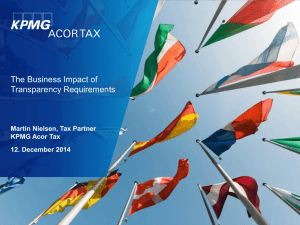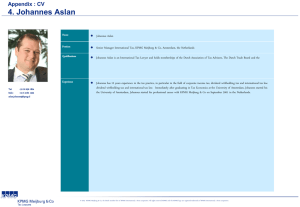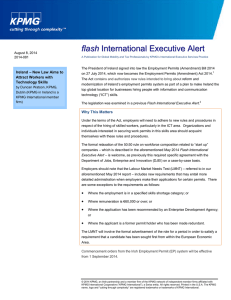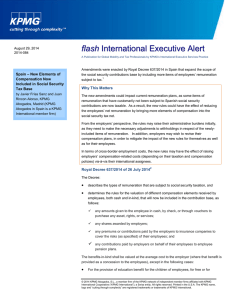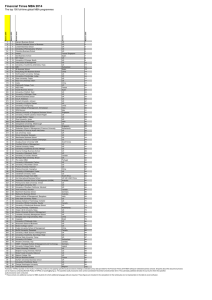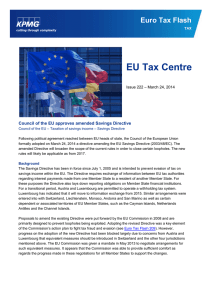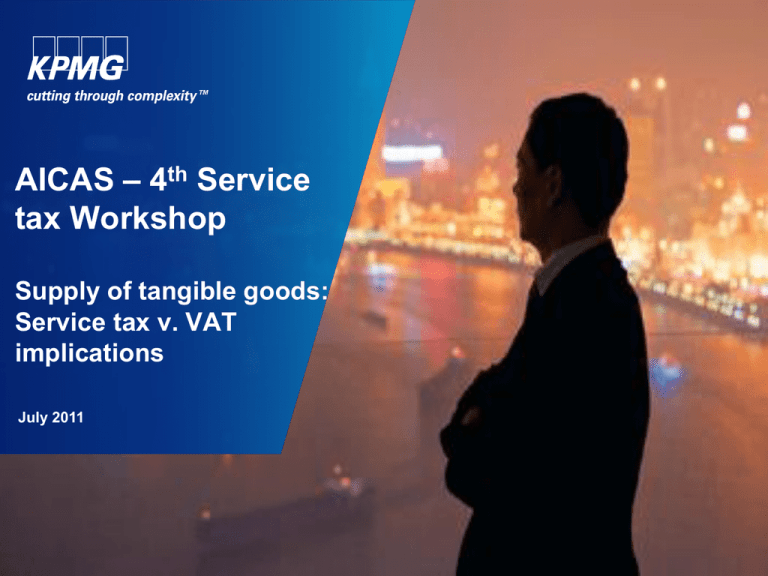
AICAS – 4th Service
tax Workshop
Supply of tangible goods:
Service tax v. VAT
implications
July 2011
© 2011 KPMG, an Indian Partnership and a member firm of the KPMG network of independent member firms
affiliated with KPMG International Cooperative (“KPMG International”), a Swiss entity. All rights reserved.
0
Contents
1
VAT implications on supply of tangible goods
2
Service tax implications on supply of tangible goods
3
Conclusion
© 2011 KPMG, an Indian Partnership and a member firm of the KPMG network of independent member firms
affiliated with KPMG International Cooperative (“KPMG International”), a Swiss entity. All rights reserved.
1
VAT Implications
© 2011 KPMG, an Indian Partnership and a member firm of the KPMG network of independent member firms
affiliated with KPMG International Cooperative (“KPMG International”), a Swiss entity. All rights reserved.
2
VAT implications on supply of tangible goods
State Legislature to impose sales tax on the sale and purchase of goods emanates from entry 54
of List II of the Seventh Schedule to the Constitution of India.
By the 46th Amendment to the Constitution of India (dated 2 February 1983), clause (29A) was
inserted in Article 366 of Constitution of India whereby scope and ambit of "tax on sale and
purchase of goods" was widened and a tax on the transfer of the right to use goods was included
within the purview of the meaning of sale and purchase of goods.
After the 46th Amendment of the Constitution came into effect, State legislators amended their
respective sales tax laws (now Value Added tax-VAT) to include sales tax on “ transfer of right to
use goods”. However, the Central Sales Tax Act, 1956 (CST Act, 1956) was amended with effect
from 11 May 2002.
In light of above, a transaction entailing sale of movable goods is generally chargeable to VAT and
includes a transaction involving ‘transfer of right to use’ such goods.
In order to determine whether an arrangement is chargeable to VAT or not, it is important to
analyze whether the arrangement contemplates a transfer of right to use the goods.
The key test applied by the Courts in determining whether a transaction would qualify as transfer
of right to use goods is whether or not there is transfer of effective control, custody and
possession of the goods from the lessor to the lessee.
The landmark judgment of Bharat Sanchar Nigam Ltd. v. Union of India [2006] 3 STT 245, the apex
court laid down essential attributes which are imperative for a transaction to constitute transfer of
right under VAT:
© 2011 KPMG, an Indian Partnership and a member firm of the KPMG network of independent member firms
affiliated with KPMG International Cooperative (“KPMG International”), a Swiss entity. All rights reserved.
3
VAT implications on supply of tangible goods (Contd..)
- There must be goods available for delivery
- There must be a consensus ad idem as to the identity of the goods
- The transferee should have a legal right to use the goods - consequently all legal consequences
of such use including any permissions or licenses required therefore should be available to the
transferee
- For the period during which the transferee has such legal right, it has to be the exclusion of the
transferor - this is the necessary concomitant of the plain language of the statute - viz. a
"transfer of the right to use" and not merely a license to use the goods
- Having transferred the right to use the goods during the period for which it is to be transferred,
the owner cannot again transfer the same rights to others
Basis the above, in general, for a transaction to qualify as a transfer of right to use goods, all of
the above mentioned conditions should cumulatively stand satisfied; thereby implying that
effective control and possession of the goods would stand transferred from the transferor to the
transferee. However, precise facts of each case would become relevant in determining the
taxability
© 2011 KPMG, an Indian Partnership and a member firm of the KPMG network of independent member firms
affiliated with KPMG International Cooperative (“KPMG International”), a Swiss entity. All rights reserved.
4
VAT implications on supply of tangible goods (Contd..)
Key Judicial Precedents
Rashtriya Ispat Nigam Ltd 2002-(126)-STC-0114-SC:
Facts
Held
•
The petitioner supplied machinery to a works contractor for the purpose of
executing the works contract of the petitioner and received hire charges for this.
•
The department’s contended that since machinery was in possession of the
contractor, there is transfer of right to use machinery from the petitioner to
contractor and hence the transaction should be subject to sales tax.
•
The effective control of machinery even while the machinery was in use with the
contractor was that of the petitioner and the machinery could only be used by the
contractor for the said work of the petitioner and could not be used by the
contractor for any other purpose at its will.
•
The condition that contractor would be liable for the machinery during the period of
the execution of the works contract does not prove that the possession and control
of machinery was not with the petitioner.
•
Delivery of possession of a thing must be distinguished from its custody. It is not
uncommon to find the transferee of goods in possession while transferor has
custody.
•
Accordingly, the transaction does not involve transfer of right to use the machinery
in favour of the contractor and therefore Sales tax not applicable on the
transaction.
© 2011 KPMG, an Indian Partnership and a member firm of the KPMG network of independent member firms
affiliated with KPMG International Cooperative (“KPMG International”), a Swiss entity. All rights reserved.
5
VAT implications on supply of tangible goods (Contd..)
CST v. Rolta Computer & Industries Pvt. Ltd. – (2009) 25 VST 322 (Bom)
Facts
Held
•
Respondents had an agreement with ONGC to process their quotation inventory
and financial accounting applications. In this case, at no point of time physical
possession or effective control of computers was given to ONGC since the
employees of ONGC would come to the office of the respondents to get their work
done and at all times the computers were operated by the employees of the
respondent. It was held by the Tribunal that the since the computers were never
delivered to ONGC, such transaction would not be taxable as ‘sale’.
•
It was contended by the department that as soon as ONGC is allowed to use the
terminal, transfer of right to use to the computer starts and it continues till the use
of the terminal is continued and therefore it attracts the sales tax.
•
Held that since ONGC was never given constructive possession of the computers
and the transaction was nothing more than a service contract whereby certain
services were provided by the respondents to ONGC. the transaction is not
taxable under VAT.
© 2011 KPMG, an Indian Partnership and a member firm of the KPMG network of independent member firms
affiliated with KPMG International Cooperative (“KPMG International”), a Swiss entity. All rights reserved.
6
VAT implications on supply of tangible goods (Contd..)
HLS Asia Limited v. State of Assam (2007) 8 VST 314
Facts
Held
•
The appellant entered into a contract with OIL for carrying out wire-line logging and
perforation activities by utilizing its own high tech equipment.
•
It was contended that the equipment remained in absolute possession of the
appellant-company and used by it to provide the required data and other
professional services. The equipment was operated by utilizing the services of
highly technically qualified and experienced personnel of the appellant-company. It
was categorically pleaded that the appellant-company used its own equipment,
which were never handed over to OIL.
•
Basis the term of agreement between parties, it was observed that the equipments
supplied by petitioner were exclusively meant for use of OIL on payment of
charges and After having placed the equipment on site, the petitioner was not
entitled to use it for any other purpose or to withdraw the same at its own sweet
will
•
The operation was subject to inspection and supervision of OIL and that there was
clear element of implied possession with OIL and accordingly amounted to lease
subject to sales tax.*
*Although the subsequent appeal w.r.t. the order of the Guwahati High Court was dismissed by the
Supreme Court for lack of factual adjudication, the principle emanating out of the said judgment may
still hold relevance.
© 2011 KPMG, an Indian Partnership and a member firm of the KPMG network of independent member firms
affiliated with KPMG International Cooperative (“KPMG International”), a Swiss entity. All rights reserved.
7
VAT implications on supply of tangible goods (Contd..)
Onaway Engineering Pvt Ltd. Vs. State of A.P. [2006] 146 STC 0634
Facts
Held
•
The petitioner operated a crane for Hindustan Shipyard Limited (HSL) for which it
received a consideration which was inclusive of fuel, lubrication, operation and
maintenance of cranes.
•
The department assessed the petitioner on the basis of the said receipts under
Section 5-E of the Andhra Pradesh General Sales Tax Act, 1957 which provides for
levy of tax on the amounts received in respect of transfer of right to use goods
which is a deemed sale.
•
The Court relied on the decisions given in the case of Rashtriya Ispat Nigam Ltd. v.
Commercial Tax Officer, Company Circle, Visakkapatnam and 20th Century
Finance Corpn. Ltd. v. State of Maharashtra.
•
Held, that since the cranes were given on hire and the possession thereof was
transferred for utilization by HSL only, transaction would be subject to sales tax
Peerless Shipping and Oil Field Services Ltd. & Anr. v. State of Assam and Ors. 2006-(ST3)GJX-0623-GAU
Facts
•
The petitioners were in contract with OIL and ONGC for providing services of
crane for drilling equipment.
•
Petitioners contended, inter alia, that such transaction is not taxable as "sale"
since the effective control on cranes at all times remained with them.
© 2011 KPMG, an Indian Partnership and a member firm of the KPMG network of independent member firms
affiliated with KPMG International Cooperative (“KPMG International”), a Swiss entity. All rights reserved.
8
VAT implications on supply of tangible goods (Contd..)
Peerless Shipping and Oil Field Services Ltd. & Anr. v. State of Assam and Ors. 2006-(ST3)GJX-0623-GAU (Contd..)
Held
•
The court observed that the contract in question clearly disclosed that after the
placement of the materials of contract, viz., machinery, vehicles, it is the absolute
will and discretion of OIL & ONGC as to how or in what manner those are to be
used. Accordingly, it discloses that the transaction in question amounts to transfer
of right to use the equipment.
•
Accordingly, due to the jural relationship existing between parties, the transaction
amounts to transfer of right to use such equipment and was a taxed under VAT.
Lakshmi Audio Visual Inc., Bangalore and Another v. The Assistant Comm of Commercial
Taxes, 17th Circle, Bangalore and Another,(2001) 51 Kar. L.J. 233 (HC)
Facts
•
Petitioner carried on the business of hiring audio and visual and multimedia
equipments. The customer contacted the petitioner and after assessing the need
and availability of the equipment, equipment is transported to the venue. It is
installed, operated, dismantled and returned to the petitioner’s office by the
petitioner’s employees.
Held
•
There is merely use of goods to render certain service or to achieve result desired
by customers, without parting with possession and control of goods used, hence,
there is no transfer of right to use goods; accordingly, these would not be subject
to sales tax.
© 2011 KPMG, an Indian Partnership and a member firm of the KPMG network of independent member firms
affiliated with KPMG International Cooperative (“KPMG International”), a Swiss entity. All rights reserved.
9
VAT implications on supply of tangible goods (Contd..)
In nutshell, the condition to qualify as transfer of right to use:
Effective control and possession should be transferred from the Transferor to Transferee
Mere custody without the effective control and possession would not amount to transfer of right to use
The transfer of the right to use entails the transfer of possession, control and rights of beneficial
enjoyment while ownership remains with the transferor
Applicable Rate on transfer of right to use
VAT generally applicable at scheduled rates for respective goods in terms of State VAT laws
Concessional CST applicable at 2% against statutory declaration in Form C
Criteria for export/ import
Where transfer of right to use goods takes place in course of export, no tax applicable
Where transfer of right to use takes place in course of import, no tax applicable
© 2011 KPMG, an Indian Partnership and a member firm of the KPMG network of independent member firms
affiliated with KPMG International Cooperative (“KPMG International”), a Swiss entity. All rights reserved.
10
VAT implications on supply of tangible goods (Contd..)
Situs of Sale:
In a Lease transaction while the right to use the asset may be transferred, the ownership of asset may
or may not get transferred from the Lessor to the Lessee
The taxable event is transfer in law of right to use the goods
Therefore, to determine the situs of sale what would be relevant:
- situs of contract which has the effect of transferring the right to use the goods or the
- location of the goods
© 2011 KPMG, an Indian Partnership and a member firm of the KPMG network of independent member firms
affiliated with KPMG International Cooperative (“KPMG International”), a Swiss entity. All rights reserved.
11
VAT implications on supply of tangible goods (Contd..)
20th Century Finance Corporation Limited v. State of Maharashtra 2000-(ST3)-GJX-0121-SC:
Merely because the goods are located or delivery of which has been effected for use within the State, it
would not necessarily be the situs of deemed sale for levy of tax, if the transfer of right to use has
taken place in some other state
The delivery of goods may be one of the element of transfer of right to use but the same would not be
condition precedent for the contract of right to use the goods
The taxable event is the transfer of right to use the goods regardless of when and where the goods are
delivered for use
The goods are not required to be left with the transferee, all that is required is the transfer of right to
use the goods. What is required is that the goods should be in existence so that they may be used and
the contract in respect thereof is executed
If the goods are in existence, the transfer of right to use takes place when the contract in respect
thereof is executed. As soon as the contract is executed, the right is vested in the lessee. The situs of
taxable event of such event would be the transfer which legally transfers the right
The transfer will be completed where the contract is executed and the control / domain of goods which
are the subject matter of contract, is given to hirer
© 2011 KPMG, an Indian Partnership and a member firm of the KPMG network of independent member firms
affiliated with KPMG International Cooperative (“KPMG International”), a Swiss entity. All rights reserved.
12
VAT implications on supply of tangible goods (Contd..)
Section 4 of CST Act, 1956 (as it stood on 11.05. 2002)
When is a sale or purchase of goods said to take place outside a State
(1) Subject to the provisions contained in Section 3, when a sale or purchase of goods is determined in
accordance with sub-section (2) to take place inside a State, such sale or purchase shall be deemed to have
taken place outside all other States.
(2) A sale or purchase of goods shall be deemed to take place inside a State if the goods are within the State (a) in the case of specific or ascertained goods, at the time the contract of sale is made; and
(b) in the case of unascertained or future goods, at the time of their appropriation to the contract of sale by the
seller or by the buyer, whether assent of the other party is prior or subsequent to such appropriation.
Explanation - Where there is a single contract of sale or purchase of goods situated at more places than one,
the provisions of this sub-section shall apply as if there were separate contracts in respect of the goods at
each of such places.”
© 2011 KPMG, an Indian Partnership and a member firm of the KPMG network of independent member firms
affiliated with KPMG International Cooperative (“KPMG International”), a Swiss entity. All rights reserved.
13
VAT implications on supply of tangible goods (Contd..)
Prior to 11-5-2002 - Situs of Sale (As per 20th Century Finance judgment):
Goods are ascertained–
- Situs of sale would be place where contract is executed and not where goods are located
Goods are not ascertained-
- Situs of sale would be location where the delivery of goods is made
Post 11-5-2002 - Situs of Sale (As per Section 4 of CST Act, 1956):
Goods are ascertained–
- Situs of sale would be where the goods are located at the time of execution of contract
Goods are not ascertained
- Situs of sale would be the place where the goods are appropriated
© 2011 KPMG, an Indian Partnership and a member firm of the KPMG network of independent member firms
affiliated with KPMG International Cooperative (“KPMG International”), a Swiss entity. All rights reserved.
14
VAT implications on supply of tangible goods (Contd..)
Illustrations: For ascertained goods
Lessor
( Mumbai)
Contract executed
in Mumbai
Lessee (Hirer)
Delhi
Car is in
West Bengal
The keys of the car are handed over in Mumbai
At the instruction of the Lessor the car is moving from WB to Delhi
The said deemed sale occasions the movement of goods from WB to Delhi
Position prior to 11-5-2002 based on 20th Century Finance – Taxable event (ascertained goods):
As the contract is executed in Mumbai and the control of the car is given in Mumbai by handing over
the keys, situs of sale arises at Maharashtra
Position post 11-5-2002 as per Section 4 of CST Act, 1956– Taxable event (ascertained goods):
As the goods are placed in West Bengal at the time of execution of the contract, situs of sale arises
at West Bengal
© 2011 KPMG, an Indian Partnership and a member firm of the KPMG network of independent member firms
affiliated with KPMG International Cooperative (“KPMG International”), a Swiss entity. All rights reserved.
15
VAT implications on supply of tangible goods (Contd..)
Illustrations: For unascertained goods
Lessor
( Mumbai)
Contract executed
in Mumbai
Lessee (Hirer)
Delhi
Manufacturer of
Car is in
West Bengal
Contract executed with a clause to deliver the car after 3 months
The car is not in existence on the date of execution of contract
Based on instruction of the Lessor, manufacturer manufactures car and the key of the car is handed
over to the hirer along with details of the car (e.g. engine no., chassis no. etc.) in Delhi
Position prior to 11-5-2002 based on 20th Century Finance – Taxable event (ascertained goods):
Sale of car from manufacturer to Lessor is complete when car delivered to Lessor or at his
instruction to the Lessee
As car is delivered to the Lessee in Delhi, situs of sale arises at Delhi
Position post 11-5-2002 as per Section 4 of CST Act, 1956– Taxable event (ascertained goods):
As the appropriation of the car takes place in Delhi, the situs of sale would be Delhi
© 2011 KPMG, an Indian Partnership and a member firm of the KPMG network of independent member firms
affiliated with KPMG International Cooperative (“KPMG International”), a Swiss entity. All rights reserved.
16
Service Tax Implications
© 2011 KPMG, an Indian Partnership and a member firm of the KPMG network of independent member firms
affiliated with KPMG International Cooperative (“KPMG International”), a Swiss entity. All rights reserved.
17
Service tax implications on supply of tangible goods
In many cases, equipment/machinery is of highly technical nature and operation of same requires
special skill and experience and in such cases, control and possession is not transferred to user.
Supply of tangible goods without transferring effective control and possession does not qualify as a
deemed sale under VAT laws but qualifies as a service, liable to service tax under taxable category of
‘Supply of tangible goods service’. The same has been brought under Service tax net wef 16 May 2008
In terms of Section 65(105)(zzzzj), the taxable service category of ‘Supply of tangible goods service’
intends to levy Service tax on service provided in relation to supply of tangible goods including
machinery, equipment and appliances for use, without transferring right of possession and effective
control of such equipment, machinery and appliances.
Therefore, a transaction of allowing another person to use the goods, without giving legal right of
possession and effective control, not being deemed sale of goods is treated as service.
Given this, Service tax implications under the aforementioned category would arise on a transaction
only in a situation where supply of tangible goods does not entail transfer of right of possession and
effective control.
© 2011 KPMG, an Indian Partnership and a member firm of the KPMG network of independent member firms
affiliated with KPMG International Cooperative (“KPMG International”), a Swiss entity. All rights reserved.
18
Service tax implications on supply of tangible goods
(Contd..)
Circular No. 334/1/2008-TRU, dated 29-2-2008 issued by the Service Tax Department states that the
transfer of right to use goods where effective control and possession is transferred is subject to VAT,
whereas a transaction where effective control and possession of the goods remain with service
provider would be subject to Service tax.
“Transfer of the right to use any goods is leviable to sales tax/VAT as deemed sale of goods. Transfer
of right to use involves transfer of both possession and control of the goods to the user of the goods.
Excavators, wheel loaders, dump trucks, crawler carriers, cranes, etc., offshore construction vessels,
tug and barge flotillas, rigs and high value machineries are supplied for use, with no legal right of
possession and effective control. Transaction of allowing another person to use the goods, without
giving legal right of possession and effective control, not being treated as sale of goods, is treated as
service.
Proposal is to levy service tax on such services provided in relation to supply of tangible goods, incl.
machinery, equipment and appliances, for use, with no legal right of possession or effective control.
Supply of tangible goods for use and leviable to VAT/sales tax as deemed sale of goods, is not covered
under the scope of proposed service. Whether a transaction involves transfer of possession and
control is a question of fact and is to be decided based on the terms of contract and other material
facts. This could be ascertainable from whether or not VAT is payable/paid.”
© 2011 KPMG, an Indian Partnership and a member firm of the KPMG network of independent member firms
affiliated with KPMG International Cooperative (“KPMG International”), a Swiss entity. All rights reserved.
19
Service tax implications on supply of tangible goods
(Contd..)
G.Karunakar Reddy v. Commissioner of Service tax, Hyderabad 2010(20) S.T.R. 352 (Tri-Bang.)
Facts
Held
•
Appellant leased out buses to Andhra Pradesh State Road Transport Corporation
for transporting passengers under a contract. As per the contract, the appellant
would be supplying the buses along with driver, who doubled as conductor when
required.
•
The authorities demanded Service tax from the appellants finding that it had
rendered ‘business auxiliary service’.
•
The Bangalore Tribunal found that the activity prima facie involved supply of
tangible goods which became taxable after the period of dispute. Accordingly, the
pre-deposit was waived by the Tribunal.
Infotech Software Dealers Association v. Union of India 2010(20) S.T.R. 289 (Mad.)
Facts
•
The developer of the software keeps back the copyright of software and transfers
only the right to use to the end user with copyright protection.
Held
•
To bring the deemed sale under Article 366 (29A)(d) of the Constitution of India,
there must be a transfer of right to use any goods and when the goods as such are
not transferred, the question of deeming sale of goods does not arise and in that
sense, the transaction would be only a service and not a sale.
© 2011 KPMG, an Indian Partnership and a member firm of the KPMG network of independent member firms
affiliated with KPMG International Cooperative (“KPMG International”), a Swiss entity. All rights reserved.
20
Service tax implications on supply of tangible goods
(Contd..)
Lease Transactions - Supply of tangible goods service :
The factors determining whether effective control and possession of assets rests with the service
provider and has not been transferred to customer includes:
- Goods are under direction and control of the service provider
- Goods may not be delivered to the customer and continue to be in possession of Service provider
- Goods are only allowed to be used for limited purposes by the recipient of services
- Service provider is absolutely free to determine the manner of use of the assets
- Service provider can change/remove the respective assets (if so required)
- Goods cannot be diverted/replaced by the recipient of services for any other project and location
- Service receiver is not free to make use of the goods for other works or move them out during the
period they are in use
Mere custody of goods is not relevant in
determining the taxability of the transaction
© 2011 KPMG, an Indian Partnership and a member firm of the KPMG network of independent member firms
affiliated with KPMG International Cooperative (“KPMG International”), a Swiss entity. All rights reserved.
21
Service tax implications on supply of tangible goods
(Contd..)
Applicable Rate
Service tax applicable at current rate of 10.3% on the gross amount charged in relation to ‘Supply of
tangible goods service’ where the aggregate value of taxable service exceeds INR 10 lakhs
Criteria for export of such services
Where such service is provided to a recipient located outside India, then such taxable service shall
be treated as ‘export’ of taxable service subject to the condition that the tangible goods supplied for
use are located outside India during the period of use of such tangible goods by a recipient located
outside India
Where the above criteria is fulfilled, no Service tax is applicable on the Indian Service provider
Criteria for import of such services
Where such service is provided to a recipient located in India, then such taxable service shall be
treated as ‘import’ of taxable service subject to the condition that the tangible goods supplied for use
are located in India during the period of use of such tangible goods by such recipient
Where the above criteria is fulfilled, Service tax is applicable on the Indian Service recipient
© 2011 KPMG, an Indian Partnership and a member firm of the KPMG network of independent member firms
affiliated with KPMG International Cooperative (“KPMG International”), a Swiss entity. All rights reserved.
22
Conclusion- Key indicators for transfer of right to use: VAT
v. Service Tax
Contractual
terms
Identification
and delivery
Exclusivity of
use
Effective control
& possession
© 2011 KPMG, an Indian Partnership and a member firm of the KPMG network of independent member firms
affiliated with KPMG International Cooperative (“KPMG International”), a Swiss entity. All rights reserved.
23
The information contained herein is of a general nature and is not intended to address the circumstances of any
particular individual or entity. Although we endeavor to provide accurate and timely information, there can be no
guarantee that such information is accurate as of the date it is received or that it will continue to be accurate in
the future. No one should act on such information without appropriate professional advice after a thorough
examination of the particular situation.
THANK YOU
Presenter’s contact details
Krishan Arora
Associate Director
KPMG
Phone number: +91 124 307 5191
Email: karora@kpmg.com
www.in.kpmg.com
© 2011 KPMG, an Indian Partnership and a member firm of the KPMG network of independent member firms affiliated
with KPMG International Cooperative (“KPMG International”), a Swiss entity. All rights reserved.
24
Annexures
© 2011 KPMG, an Indian Partnership and a member firm of the KPMG network of independent member firms
affiliated with KPMG International Cooperative (“KPMG International”), a Swiss entity. All rights reserved.
25
VAT implications on supply of tangible goods (Contd..)
Article 366(29A) of the Constitution of India
“tax on the sale or purchase of goods’ includes
(a) a tax on the transfer, otherwise than in pursuance of a contract, of property in any goods for cash,
deferred payment or other valuable consideration;
(b) a tax on the transfer of property in goods (whether as goods or in some other form) involved in
the execution of a works contract;
(c) a tax on the delivery of goods on hire-purchase or any system of payment by instalments;
(d) a tax on the transfer of the right to use any goods for any purpose (whether or not for a specified
period) for cash, deferred payment or other valuable consideration;
(e) a tax on the supply of goods by any unincorporated association or body of persons to a member
thereof for cash, deferred payment or other valuable consideration;
(f) a tax on the supply, by way of or as part of any service or in any other manner whatsoever, of
goods, being food or any other article for human consumption or any drink (whether or not
intoxicating), where such supply or service, is for cash, deferred payment or other valuable
consideration,
and such transfer, delivery or supply of any goods shall be deemed to be a sale of those goods by
the person making the transfer, delivery or supply and a purchase of those goods by the person to
whom such transfer, delivery or supply is made.”
© 2011 KPMG, an Indian Partnership and a member firm of the KPMG network of independent member firms
affiliated with KPMG International Cooperative (“KPMG International”), a Swiss entity. All rights reserved.
26
VAT implications on supply of tangible goods (Contd..)
Illustrative extract under VAT laws - Section 2(24) of MVAT Act, 2002 defines ‘sale’ as follows:
"sale" means a sale of goods made within the State for cash or deferred payment or other valuable
consideration, but does not include a mortgage, hypothecation, charge or pledge;
Explanation.- For the purposes of this clause, (a) a sale within the State includes a sale determined to be inside the State in accordance with the
principles formulated in section 4 of the Central Sales Tax Act, 1956 (74 of 1956);
(b) (i) ………;
(iii) a delivery of goods on hire-purchase or any system of payment by instalments;
(iv) the transfer of the right to use any goods for any purpose (whether or not for a specified period)
for cash, deferred payment or other valuable consideration;
Relevant extract under CST laws: Section 2(g) of CST Act, 1956 defines ‘sale’ as follows:
Sale, with its grammatical variations and cognate expressions, means any transfer of property in goods
by one person to another for cash or for deferred payment or for any other valuable consideration, and
includes
(i) ……….;
…….;
© 2011 KPMG, an Indian Partnership and a member firm of the KPMG network of independent member firms
affiliated with KPMG International Cooperative (“KPMG International”), a Swiss entity. All rights reserved.
27
VAT implications on supply of tangible goods (Contd..)
(ii) …
(iii) a delivery of goods on hire purchase or any system of payment by installments;
(iv) a transfer of the right to use any goods for any purpose (whether or not for a specified period) for
cash, deferred payment or other valuable consideration;
….
but does not include a mortgage or hypothecation of or a charge or pledge on goods.
© 2011 KPMG, an Indian Partnership and a member firm of the KPMG network of independent member firms
affiliated with KPMG International Cooperative (“KPMG International”), a Swiss entity. All rights reserved.
28

